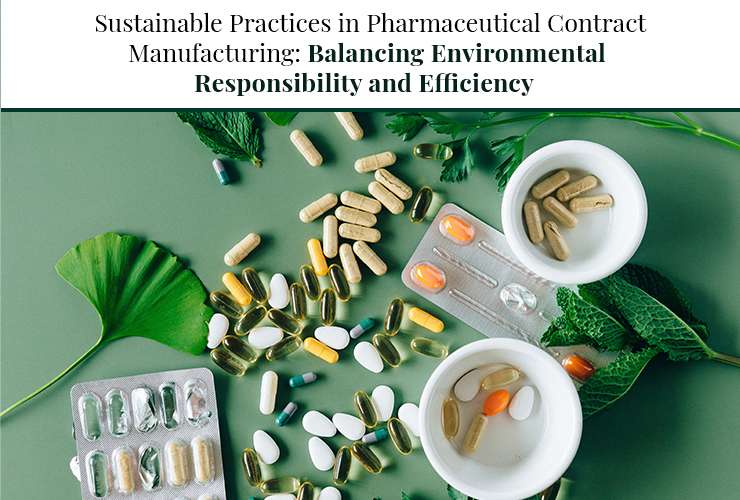

Serving mankind and balancing environmental responsibility through efficiency and compliance are the virtues accompanied in Pharmaceutical Contract Manufacturing. They work for mankind with commitment and consistency to offer eminence.
Introduction
Modernisation has increased the probability of many industries and this has given wings to many start-ups. Many industries are breeding contributing to the growth of the industries. Along with a competition to outshine, there has been a budding importance on sustainable practices in innumerable industries to maintain ecological balance reducing the environmental impact of manufacturing processes and confirm long-standing resource availability. Harmonizing ecological accountability with effectiveness is vital for pharmaceutical contract manufacturing to meet these sustainability goals.
Requirement of sustainable practices
Sustainable practices remain crucial in Pharmaceutical Contract Manufacturers in India and around. These practices are the activities and policies that complement continuing environmental balance, monetary feasibility, and societal well-being. These practices are meant to reduce the adverse influences on natural resources, decrease waste generation, encourage energy efficacy, and improve the total quality of lifecycle for current and upcoming generations, for example, using renewable energy sources, preserving water, applying green building practices, working accountable sourcing and manufacturing.
Practices adopted by pharmaceutical contract manufacturers
Compliance with guidelines offered by the regulatory bodies and assurance of the quality standards are integral parts of pharmaceutical contract manufacturing. They use different techniques that are based on sustainable practices, here are some examples:
- The processes used in contract manufacturing are energy-intensive to optimize the usage of energy. Manufacturing companies use energy-efficient technologies to reduce energy consumption. Applying energy management systems and conducting regular energy audits also help classify energy-saving prospects.
- Waste minimization techniques to reduce the generation of various types of waste remain a part of pharmaceutical contract manufacturing. Even waste minimization techniques like recycling, reusing, and reclaiming materials are used by them during manufacturing processes. They also try to use techniques that segregate waste and properly dispose off processes to ensure compliance with environmental regulations.
- Water scarcity is considered a global issue, to save this natural resource Pharmaceutical Contract Manufacturers in India and abroad use water management techniques that can conserve, recycle, and reuse the maximum quantity of water. Even they try to reduce the consumption of water through process optimization and equipment upgrades.
- They maintain a consistent supply chain that abides and maintains sustainable practices like judicious waste management and promoting recycling initiatives. Even using environment-friendly packaging materials like recycled or biodegradable materials remains beneficial.
- Life cycle assessment of products, machinery, and processes helps to reduce the negative impact as well. Utilization of the understandings obtained from a Life Cycle Assessment, manufacturers make conversant decisions that balance environmental responsibility and efficiency.
- To implement all the techniques and strategies staff is trained accordingly. They are regularly educated and evaluated on their practices to check complete compliance with sustainable practices.
Akums Drugs and Pharmaceuticals Ltd.
Akums Drugs and Pharmaceuticals Ltd. is a renowned Pharmaceutical Contract Manufacturer in India that is known as an environmentally responsible firm whose efforts and manufacturing are completely oriented and imbibed with sustainable practices. They remain accountable to mankind and their environment and thus remain focused on getting a harmonious balance between the two.
FAQ
Q1. What are the benefits of adopting sustainable practices in manufacturing?
By using sustainable practices, pharmaceutical contract manufacturers reduce their environmental footprints but also achieve long-term cost savings and enhance their reputation as responsible corporate citizens.
Q2. What do you understand by sustainable practices in pharmaceuticals?
Sustainable practices are the activities and policies that complement continuing environmental balance, monetary feasibility, and societal well-being. These practices are meant to reduce the adverse influences on natural resources, decrease waste generation, encourage energy efficacy, and improve the total quality of lifecycle for current and upcoming generations.



